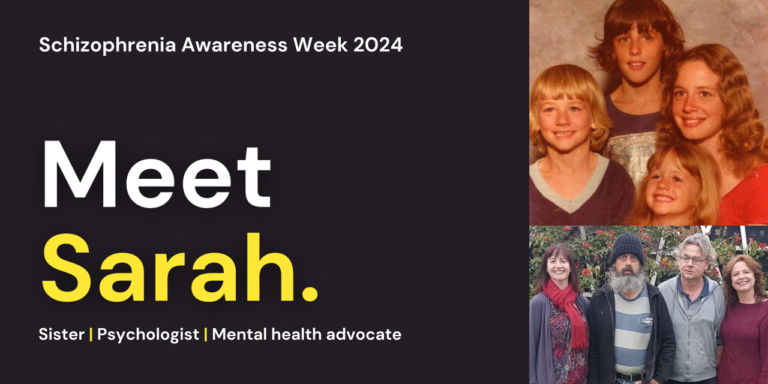Sarah was 15 when her older brother Peter, then 21, “cowardly punched” her at a party, leaving her with a broken jaw and brain injury. A year later, in 1992, her younger brother Ben, aged 17, was diagnosed with schizophrenia.
These events marked the beginning of a journey that would not only bring challenges, but also inspire a lifelong commitment to mental health advocacy.
Growing up in a household with two siblings who faced significant health challenges, Sarah and her family faced many challenges. “My brother’s diagnosis had a big impact on me and my family,” she explains. “There is an extreme lack of understanding from the general community about this diagnosis – people don’t know what to tell you…we were very close as a result of the social attitudes that exist – we had to come together as a family to provide support and companionship to each other to the other”. The struggle to balance her education with the demands at home was tough. “During my early university studies, I found it very difficult to study as both my brothers lived at home. They were bored, they had nothing to do, but they didn’t get any support to keep them engaged in the community … my father had to take a year off work to look after them.”
Despite the hardships, Sarah and her family found solace in shared hobbies and passions. “Our whole family loves fishing. When we were young we went on many camping trips along the Murray River. Even now, me and my brother Ben go fishing with my dad and my own kids,” he shares. . Music also played a big role in their lives. “Our family grew up listening to great Aussie bands like Cold Chisel, Crowded House, The Hunters and Collectors.”
Sarah’s lived experience has shaped her perspective on mental health and the importance of advocacy. “Growing up with a lived experience, both my parents shielded me significantly from all the stress and bureaucracy of the ‘mental health system’ and the lack of community support and truly person-centered care,” she notes. This protective shield also extended to the stigma that exists in the community. “My parents protected me from the significant stigma and many myths that members of the community hold about schizophrenia.”
Sarah’s involvement with the Schizophrenia Fellowship Education Team in South Australia (now Skylight) was transformative. “In this group, we received training about schizophrenia and traveled around speaking to different community groups to educate them about the disease,” she recalls. “My mother and I were very fortunate to attend a media education workshop with the late Anne Deveson. Anne and Dr Margaret Leggatt co-founded SANE. Anne’s book Tell Me I’m Here, about her son, Jonathan, was a great introduction for me to learning about Schizophrenia and the obstacles people with this diagnosis face. This experience inspired Sarah to pursue a career in clinical and forensic psychology, aiming to impact the mental health system from within.
Sarah’s motivation for sharing her story is clear. “I started state and national mental health advocacy to improve mental health service delivery. However, with the launch of the National Disability Insurance System (NDIS), my focus has now shifted to improving the NDIS,” she says. “Since my siblings first received their original NDIS plans in 2019, they have not been hospitalized, which is a huge change for our whole family, with far less trauma experienced as a result, not to mention the financial savings … improved community supports the work! ”
For those facing similar challenges, Sarah offers words of encouragement. “Know your rights, familiarize yourself with the Carers Recognition Act, join local support groups and join SANE online carer forums,” she advises. “Peer support will be your best friend in learning how to access and navigate services.”
Sarah’s advice on seeking help is clear. “Don’t be afraid to ask questions, ask for clarification, take notes in care team meetings, write things down and seek peer support,” she recommends. “If your family qualifies for the NDIS, access support to make an application… it’s worth it.”
Sarah’s story is a testament to the importance of raising awareness and reducing the stigma surrounding schizophrenia. “It’s so important to raise awareness and share our family history to reduce the stigma surrounding mental illness and challenge the many stereotypes and negative attitudes that persist in the community about schizophrenia,” she stresses. “My siblings are gentle, loving and kind, sensitive souls. They deserve understanding and support, not fear and discrimination.”
Sarah’s journey of resilience, advocacy and unwavering support for her siblings highlights the power of family, community and education in meeting the challenges of complex mental health conditions.
